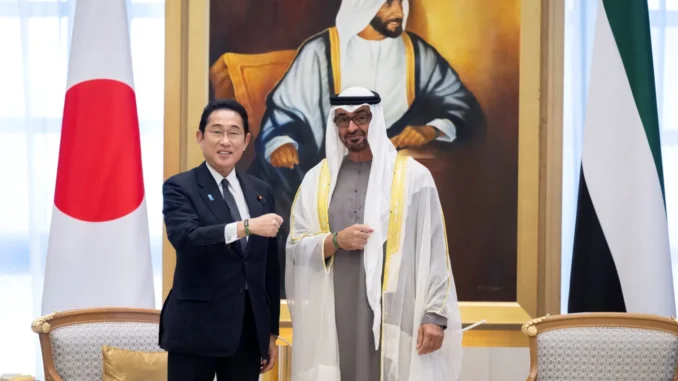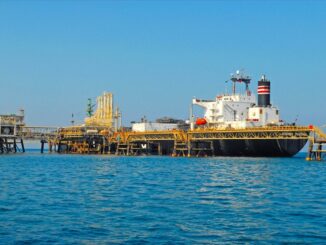
As the Gulf Arab states seek to gradually transition away from hydrocarbon dependence, Japan has stepped in as a partner, deepening its strategic and economic ties with the United Arab Emirates and the wider region. Japanese Prime Minster Fumio Kishida’s July 16-19 tour of the Middle East aimed to reinforce Japan’s energy security, promote Japanese green technology, and boost regional economic ties. During Kishida’s stop in the UAE, Japan and the UAE signed 23 agreements at the UAE-Japan Business Forum to strengthen cooperation on issues including energy, industry, advanced technology, transportation, conservation, and the circular economy. To strengthen their existing strategic partnership, the UAE and Japan agreed to a new innovation partnership meant to advance energy security, including through Emirati investments in Japanese semiconductor and battery plants.
During Kishida’s meeting with UAE President Mohammed bin Zayed al-Nahyan, the leaders agreed to facilitate cooperation on hydrogen and ammonia production to accelerate the clean energy transition, with both states aiming to achieve net-zero carbon emissions by 2050. In a joint statement, Japan and the UAE underlined their commitment to “enhance cooperation on climate ambition, decarbonization, and clean energy,” a particularly critically timed pledge for the UAE, which is gearing up to host the United Nations Climate Change Conference, COP28, in November.
In a bid to support regional aims of decreasing dependence on oil production, Kishida announced Japan’s plans for a “global green energy hub” through which Japan would assist Saudi Arabia and the UAE in developing and producing Gulf-based solar power and green ammonia facilities. In the lead up to his arrival, Kishida wrote that the green hub initiative intends to “combine the respective strengths of our two countries: the geographical advantages, low-cost renewable energy resources and strong investment capacities of the UAE and the Middle East on one hand; and the cutting-edge decarbonization technologies of Japan on the other.”
Japan and the UAE have highlighted the importance of a gradual energy transition, both to avoid creating unrealistic expectations and, more importantly, to circumvent the negative economic repercussions tied to a swift shift to renewable energy before infrastructure and supply demands can be met at a larger scale. Their shared interest in developing UAE-produced clean energy, including green hydrogen and ammonia, serves Japan’s interest in diversifying its renewable energy mix while also boosting the UAE’s global position as a reliable green energy supplier as it transitions away from hydrocarbon dependence.
Pivot From Hydrocarbon Dependence to Renewable Energy Collaboration
Despite intentions to achieve net-zero emissions by 2050, oil and gas continue to account for 85% of Japan’s primary energy mix. A challenge for Japan has long remained its lack of indigenous fossil fuel natural resources combined with a mountainous landscape and steep coastline that complicate efforts to adequately scale-up renewable energy to meet the demands of Japan’s densely populated cities. And even as Japan has been reducing its reliance on crude oil imports over the last decade, it is importing larger volumes from the Middle East. The continuing reliance on hydrocarbons has deepened Japan’s economic ties to the resource-rich Gulf Arab states; 95% of Japan’s crude oil imports in 2023 have come from the GCC states – 43% from the UAE alone.
In spite of Japan’s still heavy reliance on Gulf oil supplies, alternative energy agreements are not new to UAE-Japan relations. In May 2013, Japan and the UAE signed a bilateral agreement that cleared the path for transferring nuclear materials and technology between the two countries. The agreement was a major step for the UAE, which was in the process of constructing the Barakah nuclear power plant, the first of its kind in the Arab world.
Under the framework of their 2022 strategic partnership, the UAE and Japan signed several preliminary agreements during Abu Dhabi Sustainability Week in January 2023, including the Japan-UAE Collaboration Scheme for Advanced Technology, to support a clean energy transition with an emphasis on exploring the hydrogen sector as a key component of a net-zero future. After signing the agreements, COP28 President-designate Sultan Ahmed Al Jaber, who is also the UAE’s special envoy to Japan, said the UAE plans to build on its relationship with Japan by “exploring new opportunities for cooperation and investment that contribute to mutually beneficial sustainable growth and diversification.”
While access to stable oil markets will remain a primary concern for Japan’s energy security in the immediate future, its pivot toward alternative energy in partnership with the UAE could lessen its dependence on oil and gas. Green ammonia and hydrogen emit no carbon dioxide and can help decarbonize hard-to-abate sectors, such as steel, cement, and other heavy industries. Japan and the UAE signed an agreement in 2021 to explore the feasibility of cooperating on hydrogen production, including the development of an international supply chain that would transport hydrogen produced in the UAE to Japan. In November 2022, the Dubai-based Emirates National Oil Company signed a preliminary agreement with Japan’s IHI Corporation, a heavy industry manufacturer, to produce green ammonia and low-carbon hydrogen in the UAE, which could then be exported to Japan and across Asia and distributed to local utility and shipping companies.
In January, Masdar, the UAE’s state-owned renewable energy company, signed an agreement with JERA, a company that produces 30% of Japan’s electricity, to collaborate on the development of green hydrogen and renewable energy. In January, the Abu Dhabi National Oil Company and Tsubame BHB, a Japanese developer of ammonia synthesis technology, signed a similar agreement to explore new methods of manufacturing clean ammonia. The agreement, which falls under the Japanese-Emirati partnership for advanced technology, aims to use the UAE’s renewable energy resources and Tsubame BHB’s ammonia manufacturing technology to develop lower-cost clean ammonia. Jaber has highlighted the role of such joint initiatives in harnessing new, commercially feasible technologies to reduce carbon emissions.
ADNOC announced in late July that it was bringing forward its net-zero target by five years to 2045 and aims to eliminate methane emissions by 2030. Japan’s oil and gas exploration and production company Inpex has held upstream oil assets in Abu Dhabi in partnership with ADNOC for decades. The latest agreements represent a new direction for Japanese investments in the UAE.
The Fall of the Japanese Tech Sector and Rise of Chinese Influence in the Gulf
Once viewed as a technological powerhouse with minimal market competition, Japan now confronts a declining and aging population that is affecting its economic growth and competitive edge. China and other countries, such as India and South Korea, have surpassed Japan in the technology sector. Japan’s current deficit of technological innovation stems from a lack of funding for new startups. Japanese investors are more risk averse than those in other countries, and the government and private sectors have yet to prioritize research and development strategies. A key goal of the UAE-Japan partnership for advanced technology is connecting Japanese startups with Emirati investors to help cultivate growing enterprises.
Likewise, a key regional concern for Japan is China’s rising political influence in the Gulf, a point underscored by the recent Chinese-brokered agreement between Saudi Arabia and Iran to restore diplomatic ties. Like Japan, regional stability is key to China’s energy security and played a factor in its decision to assume the role of mediator.
While China continues to purchase deeply discounted Russian crude, Beijing also remains heavily dependent on Gulf oil, with more than 50% of its crude imports coming from the region in 2022. For China and Japan, expanding strategic cooperation in the Gulf remains key to safeguarding growing domestic energy needs. However, both countries also aim to serve as reliable investment partners in the region’s post-hydrocarbon economic pivot. In December 2022, China signed a preliminary agreement to supply renewable energy storage to power Saudi Arabia’s megaproject Neom. Likewise, in May 2023, Dubai-based technology-investment corporation Mensha Ventures signed a memorandum of understanding with multiple Chinese entities to invest $1 billion in green infrastructure projects throughout the region.
To offset, at least to some extent, China’s rising influence in the Gulf, Japan must continue to invest in redefining its regional relationships, meeting the changing needs of its Gulf partners as the region shifts toward an era of decarbonization.



